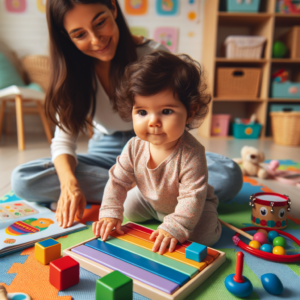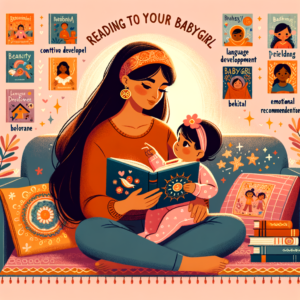Developing social skills is a crucial part of your babygirl’s growth and development. These skills will help her form relationships, communicate effectively, and navigate social situations throughout her life. This comprehensive guide will help you understand the stages of social development and provide strategies to encourage positive social interactions for your babygirl.
Stages of Social Development
Understanding the typical stages can help you support your babygirl’s social growth:
0-3 Months:
- Begins to smile at people
- Recognizes familiar faces
- May cry when socializing stops
3-6 Months:
- Smiles spontaneously, especially at people
- Enjoys playing with others, especially parents
- Responds to other people’s emotions
6-9 Months:
- Distinguishes between familiar faces and strangers
- Enjoys social play (peek-a-boo, pat-a-cake)
- May show anxiety around strangers
9-12 Months:
- Plays simple games like “peek-a-boo”
- May become clingy with familiar adults
- Responds to simple verbal requests
Strategies to Encourage Positive Social Interactions
- Responsive Caregiving
- Respond promptly to your babygirl’s cues
- This builds trust and secure attachment
- Face-to-Face Interaction
- Engage in plenty of eye contact
- Talk, sing, and make expressions for her to mimic
- Playgroups and Playdates
- Expose your babygirl to other children
- Start with short, supervised interactions
- Narrate Social Situations
- Describe what’s happening in social settings
- This helps her understand social cues and expectations
- Encourage Turn-Taking
- Play simple turn-taking games
- This lays the foundation for future conversations and sharing
- Model Good Social Behavior
- Demonstrate kindness and politeness in your interactions
- Your babygirl will learn by observing you
- Use Positive Reinforcement
- Praise your babygirl for positive social behaviors
- This encourages her to repeat these behaviors
- Create Opportunities for Interaction
- Visit parks, libraries, or children’s museums
- Enroll in age-appropriate classes (e.g., parent-child music classes)
- Teach Emotional Recognition
- Use books or pictures to discuss different emotions
- Help her identify and name her own feelings
- Respect Her Temperament
- Some babies are naturally more social than others
- Don’t force interactions if she’s feeling shy or overwhelmed
Addressing Common Social Challenges
Stranger Anxiety
- Typically emerges around 6-8 months
- Respect your babygirl’s feelings
- Introduce new people gradually
- Stay close to provide security
Separation Anxiety
- Often peaks around 10-18 months
- Create a goodbye ritual
- Keep goodbyes brief and positive
- Ensure she’s left with familiar, trusted caregivers
Sharing and Turn-Taking
- This concept develops gradually
- Model sharing behavior
- Use positive reinforcement when she shares
- Don’t force sharing, but gently encourage it
The Role of Play in Social Development
Play is crucial for social development. Here are some ideas:
- Parallel Play
- Place babies near each other with their own toys
- This early form of social play is common in the first year
- Imitative Play
- Encourage your babygirl to imitate your actions
- This helps develop social understanding and empathy
- Cooperative Play
- As she gets older, encourage playing together with others
- This might involve sharing toys or simple games
- Pretend Play
- Around 18 months, introduce simple pretend play scenarios
- This helps develop perspective-taking skills
The Importance of Routine
Consistent routines can help your babygirl feel secure and understand what to expect in social situations:
| 1. Establish regular mealtimes, nap times, and bedtimes |
|---|
- Create rituals for transitions (e.g., a special song for cleanup time)
- Prepare her for new social situations by explaining what will happen
Frequently Asked Questions
Q: My 9-month-old babygirl cries when strangers approach. Is this normal? A: Yes, stranger anxiety is a normal developmental stage. Respect her feelings and introduce new people gradually.
Q: How can I help my babygirl make friends? A: At this young age, focus on providing opportunities for social interaction through playdates and classes. Friendship skills will develop naturally over time.
Q: Should I be concerned if my babygirl prefers to play alone? A: Every child has their own temperament. Some enjoy solitary play more than others. As long as she’s meeting developmental milestones, this is likely normal.
Q: How can I teach my babygirl to share? A: Sharing is a complex skill that develops over time. Model sharing behavior, praise attempts at sharing, and be patient as she learns.
Conclusion
Developing social skills is a gradual process that begins from birth. By providing a loving, responsive environment and plenty of opportunities for positive social interactions, you’re laying the foundation for your babygirl’s future social success.
Remember that every child develops at their own pace, and it’s normal for babies and toddlers to be at different stages of social development. The most important thing is to provide consistent love, support, and opportunities for social growth.
As you guide your babygirl through these early stages of social development, celebrate her progress and be patient with challenges. Your loving guidance is helping to shape a confident, empathetic, and socially adept individual who will thrive in her relationships throughout life.
Enjoy this special time of watching your babygirl discover the joys of social interaction. From her first social smiles to her first friendships, each step is a beautiful part of her journey in becoming a social being. Your support and encouragement are invaluable in this process!


